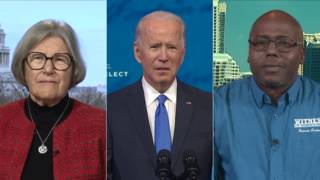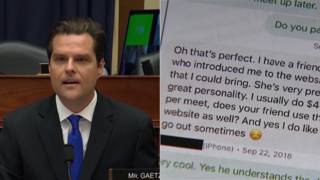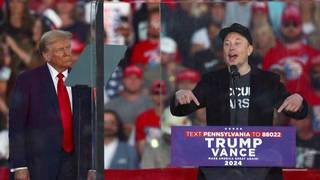
Related
Guests
- Greg Grandinprofessor of Latin American history at New York University. He is the author of Empire’s Workshop: Latin America, the United States, and the Rise of the New Imperialism. His most recent book, Fordlandia, was a finalist for the Pulitzer Prize in history.
Brazil has made history with the swearing-in of its first female president. On Saturday, Dilma Rousseff received the presidential sash from outgoing President Lula da Silva at a ceremony in the capital Brasília. In the 1960s, Rousseff was a guerrilla resisting Brazil’s military dictatorship. She was imprisoned and tortured for three years. We speak with Greg Grandin, professor of Latin American history at New York University. [includes rush transcript]
Transcript
AMY GOODMAN: We turn now internationally, look south to Brazil, which has made history with the swearing-in of its first female president. On Saturday, Dilma Rousseff received the presidential sash from outgoing President Lula da Silva at a ceremony in the capital Brasília. In her inaugural speech, Rousseff paid tribute to Lula and repeated her pledge to eradicate chronic poverty in Brazil.
PRESIDENT DILMA ROUSSEFF: [translated] The task of succeeding President Lula is challenging. I will know how to honor this legacy. I will fight for the necessary changes in education, in health and security, and, above all, I will fight to end poverty and misery.
AMY GOODMAN: Dilma Rousseff spoke before tens of thousands of supporters at the presidential palace. Two Brazilian women reflected on the significance of her inauguration.
LEILA REBOUCAS: [translated] I hope this will be a great moment for Brazil and for all of us women who have been waiting a long, long time for this moment.
MARINA SILVA: [translated] For many years, we have dreamed of this historic moment: a woman who is a fighter taking over the presidency of a country like Brazil. And today we are here to see Dilma walking up the ramp with the presidential sash. This is also our fight. This is a victory for the Brazilian people.
AMY GOODMAN: During the 1960s and '70s, Rousseff was a guerrilla. She was involved in the armed struggle against Brazil's military dictatorship. She was imprisoned for nearly three years and tortured. Joining her at the inauguration were 11 women with whom she was imprisoned during that time.
Other attendees included Secretary of State Hillary Clinton and Venezuelan President Hugo Chávez. They shook hands. Their encounter comes just days after the U.S. revoked the visa of the Venezuelan ambassador to Washington following Chávez’s rejection of Obama administration appointee Larry Palmer as U.S. ambassador to Venezuela.
Lula leaves office after an eight-year run that saw him become the most popular Brazilian president in the country’s history. A former trade unionist, he was the first presidential nominee to win for the Workers’ Party in Brazil, known as the PT, and the first working-class leader of Latin America’s biggest country. During his two terms, some 20 million Brazilians were lifted out of poverty, and Brazil’s minimum wage increased by more than half. But some critics say Lula didn’t go far enough in rejecting U.S.-backed neoliberal policies and favored domestic and international agribusiness at the expense of Brazil’s small farmers and landless peasants.
As Lula’s handpicked successor and his former chief of staff, Dilma Rousseff is expected to continue many of his policies. To discuss Rousseff’s historic inauguration and what her presidency means for Brazil, we’re joined here in New York by Greg Grandin, professor of Latin American history at New York University, author of Empire’s Workshop: Latin America, the United States, and the Rise of the New Imperialism. His most recent book, Fordlandia, was a finalist for the Pulitzer Prize in history.
Welcome to Democracy Now!
GREG GRANDIN: Thanks for having me.
AMY GOODMAN: Why don’t you give us the biography of this, well, remarkable new president of Brazil? Her history is astounding, Dilma Rousseff.
GREG GRANDIN: Yeah, arguably the most powerful woman in the world. She was born in 1947 — she’s 63 years old — in the provinces, a middle-class family, lower middle class. Her father was a Bulgarian immigrant, her mother a Brazilian school teacher. And she came of age during a time when the middle class could actually develop a social consciousness, a political consciousness. Her mother had her read Zola and Dostoevsky. The nuns at her school introduced her to rural poverty, urban poverty. And she became political at an early age. And when she was 16 years old, she joined a political faction that had split off from the Communist Party to work with urban workers. And then, with the coups in Brazil — there was one coup in ’64 and then a much more radical right-wing coup in ’68 — she became much more politicized herself. She joined an urban guerrilla group in — I think probably in 1967, ’68. And she was arrested in 1970. And just over the last couple of months, documents have been declassified in Brazil that illustrate that she suffered widespread torture, extreme torture, electric torture. She was released after a little bit less than three years.
And she went on to get a degree in economics, and she entered politics, first in the state of Porto Alegre and then in Rio Grande do Sul. And she developed a reputation as an extremely efficient economist and administrator, particularly around energy issues. When she was the minister of energy in Rio Grande in the 1990s, you can think of her as being the anti-Enron. Where Enron speculated and basically turned energy into a big gaming initiative in the United States and led to rolling blackouts in California, she did the exact opposite. She built up public infrastructure. She invested heavily. She consolidated the notion that energy was a common good, a public good. And then she joined the Workers’ Party around 2000 and became Lula’s chief of staff in 2003.
AMY GOODMAN: The first woman chief of staff of Brazil.
GREG GRANDIN: Yeah, well, first she was minister of energy, and she was always — she was involved in overseeing Petrobras, Brazil’s public oil company, over the course of Lula’s two administrations. But first she was minister of energy on a national level, and then she became chief of staff in 2004, I believe, early on in about the middle of his — of Lula’s first term, after a series of scandals pushed out Lula’s first chief of staff, and has been described as Lula’s prime minister — there’s no prime minister officially in Brazil, but basically an executor of domestic policy, particularly around energy.
AMY GOODMAN: And she also had cancer.
GREG GRANDIN: She did. She overcame and apparently triumphed over lymphoma, serious form of cancer. And this was caught after she had already announced for the presidency, and apparently has — is in remission.
AMY GOODMAN: So, talk about how she became the president of Brazil.
GREG GRANDIN: Well, Lula is enormously popular, and she was Lula’s handpicked successor, basically. As I said, she was Lula’s right-hand woman. She was very close, and they developed a very close bond. And he — and Lula’s enormous popularity, he’s going out of office with 80 percent popular approval ratings. And internationally, he has basically changed the rules of the interstate system on a number of levels, which we could talk about, certainly in the Americas. And so, he threw his enormous weight behind her.
AMY GOODMAN: I want to go to a clip of Lula, the outgoing Brazilian president, Lula da Silva, who broke into tears during his farewell address.
PRESIDENT LUIZ INÁCIO LULA DA SILVA: [translated] Back then, I was worried. What was my concern? Was I ready to rule this country? Was I prepared to deal with everything? Sometimes I would lie down next to my wife in the government’s palace, and I would say, “Marisa, I wonder if this is real, if we are actually here. We are sleeping in the room on the same bed that so many presidents have slept, on this bed. Marisa, is this actually real?” If I fail, it would be the workers’ class which would be failing. It would be the country’s poor who would be proving they did not have what it takes to rule.
AMY GOODMAN: That was the outgoing president of Brazil Lula. And now it’s Dilma Rousseff, the first woman president of Brazil. Let’s talk about where she will take the country, what her stands are. First, is it fair to call her the Marxist guerrilla turned president?
GREG GRANDIN: Well, I mean, she’s obviously evolved in her political and economic views and what she personally believes will be conditioned by the realities and complexities of Brazilian society. It’s the largest economy in the Americas, short of the United States and Canada, certainly in Latin America. It has a complex social system and political structure, so she will not — you know, however she understands her role or her ethics and beliefs, she will be conditioned by that, just as Lula was.
She represents a number of things. I think she represents, as coming to the office as a torture victim, it’s important to point out that Brazil, in some ways, hasn’t confronted its past. Some 17,000 to 20,000 Brazilians were tortured under the dictatorship. Other countries in the Southern Cone — Chile, Argentina, Uruguay — have confronted this legacy more directly.
AMY GOODMAN: I mean, Argentina has something like 400 trials going on right now.
GREG GRANDIN: Yeah, right.
AMY GOODMAN: And Videla was just put away for life.
GREG GRANDIN: And in all sorts of ways, there’s been much more direct confrontation. Lula was very reticent on taking on this issue. There was an amnesty law that was passed in 1979 that just in April of this past — in 2010, was reaffirmed, in which torturers and murderers and repressors during the military regime can’t be touched. Right now, as we speak, three or four of the people responsible for Dilma’s torture are under investigation. They can’t be prosecuted criminally because of the upholding of this amnesty law, but they can be brought in civil trials. They could have their pension removed. I think Dilma’s ascension to the presidency will in some ways force this issue, which has been off the table, into public discussion, along the lines of in Venezuela, in Chile, in Uruguay.
In terms of foreign policy, it seems that she’s committed to continuing Lula’s — Lula did a — I mean, it must be said, Lula presided over this enormous revolution in the interstate system. He basically was able to further integration among Latin America, steer an independent course outside of the U.S. on a host of issues — Iran, Venezuela, Palestine. Mahmoud Abbas was actually also at the inauguration. He laid the cornerstone of a Palestinian embassy in Brasília, because Lula recognized Palestine.
AMY GOODMAN: Very significant. Brazil did. Bolivia did.
GREG GRANDIN: Then Argentina. Yeah, then Bolivia, yeah.
AMY GOODMAN: Argentina.
GREG GRANDIN: Yeah, very significant. And it seems clear that Dilma will try to carry on this legacy. Whether she’s successful and has the same — I think there will be a lot of pressure on her.
Domestically, I think she faces quite a number of challenges. She’s known as a statist, in terms of the economy, and she presided over Lula’s very successful investment in public infrastructure, in public economic growth. But she’s going to be under a lot of pressure to privatize and to roll back spending in order to lower interest rates. And the only place you can really do that is cutting back a lot of the social spending that the Lula administration, that you talked about in your introduction, was quite successful at.
AMY GOODMAN: Very quickly, under — in one of the WikiLeaks releases, one of the U.S. diplomatic cables, talking about the Landless Movement in Brazil and the effect Lula had in marginalizing them. Again, this was the U.S. government’s view.
GREG GRANDIN: Yeah, I mean, I think the way to think about it is Lula turned the PT, the Workers’ Party, from a mobilized political party into a more traditional representative party. And part of that was not — and Lula didn’t fulfill his promise about land reform. And not just that, a lot of his economic success is banked on really large-scale agro industry commodities — soy, corn, cattle — there’s more cows in Brazil than there are people — Cargill, Monsanto, Archer Daniels Midland, some U.S. firms that have benefited enormously from that.
The Landless Movement supported Lula, and they were very critical, and they supported Dilma. It remains to be seen how that relationship — and the Landless Movement is the most, hands down, important social movement in Latin America. It’s seized and expropriated about five times the size of the state of Massachusetts and redistributed it to landless people. And it’s got a very complex relationship with the PT right now, and it remains to be seen how Dilma is going to negotiate that.
AMY GOODMAN: In foreign policy, the significance of that handshake between Secretary of State Hillary Clinton and Venezuelan President Chávez at the inauguration of Dilma Rousseff?
GREG GRANDIN: Well, we’ve seen this before in Trinidad with the Summit of the Americas, when Obama and Chávez seemed to be getting off on a fresh start, but then events quickly overtook that, most notably the U.S. support for the Honduran coup and its — or not support maybe for the coup, but certainly legitimating the coup, which alienated Brazil and certainly alienated Venezuela. I don’t know if that handshake —- I think a spontaneous handshake. Obviously Chávez could be quite a charming person, despite the way he’s portrayed in the media, and -—
AMY GOODMAN: In this country?
GREG GRANDIN: In this country.
AMY GOODMAN: In the United States.
GREG GRANDIN: In this country. So that remains to be seen, if that’s a — if that marks a turning point in U.S.-Venezuelan relations.
AMY GOODMAN: And the effect of a woman leading the largest Latin American country?
GREG GRANDIN: Yeah, she — out of 37 ministries, now nine are headed by women. That’s not quite parity, but it’s three times more than under the Lula administration. Unfortunately, it seems like the men are in charge of the military, the economy and foreign policy still, and women have been given more the social ministries. But it certainly will have a symbolic importance, and issues such as abortion rights and the more liberalization of gender rights certainly will be now a public issue in Brazil.
AMY GOODMAN: Greg Grandin, I want to thank you for being with us. He teaches Latin American history at New York University, author of Empire’s Workshop: Latin America, the United States, and the Rise of the New Imperialism. His most recent book, Fordlandia, was a finalist for the Pulitzer Prize.












Media Options